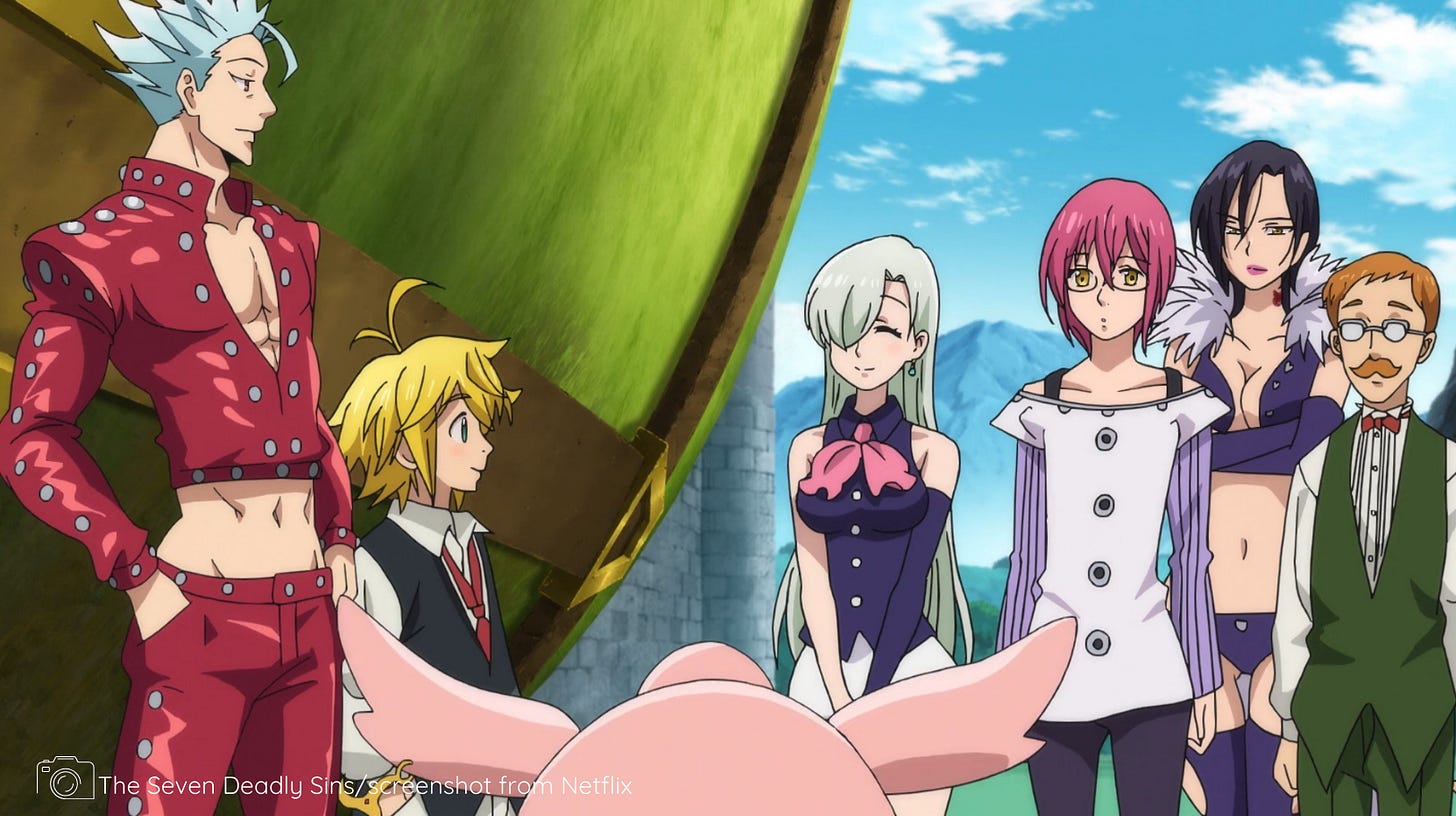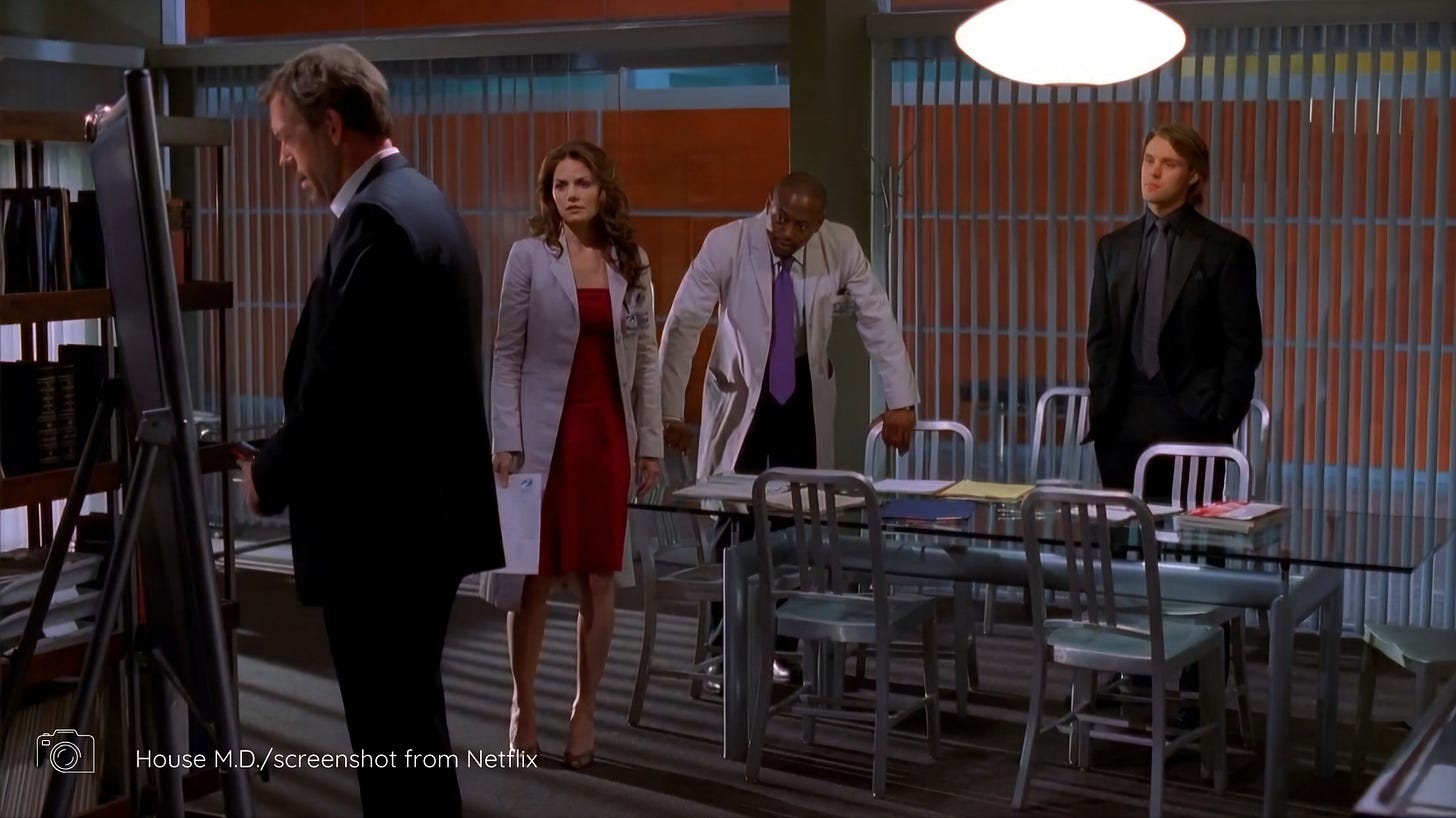[CW: sexual assault, grooming]
There’s pop culture that’s obviously problematic, then there’s pop culture that’s problematic in a way that’s only clear if you’ve spent your life overthinking intersectional feminism and pop culture. This article is about the second one, because it’s the harder one to pinpoint, and maybe the most important one because of that. See, most leftish (this isn’t a typo) men know better than to tell you that they love Two and a Half Men, because even they know that’s a red flag. But can they tell you why How I Met Your Mother is problematic? (Spoiler alert: it’s not only because of Barney.)
In ‘A Dozen of Red Flags’, I offer you the 21st century pop culture that makes me go ‘hmmmm’ when I’m interviewing a man on a first date, hoping that it’ll now also make you go ‘hmmmm’ when you’re interviewing a man on a first date. (And a second, and third, and fourth. It’s never too late to get the ick.)
Today, the bottom six.
12. The Seven Deadly Sins (2014-2021)
The Seven Deadly Sins is an anime about seven Knights named The Seven Deadly Sins, who used to be the most powerful knights in the Kingdom, but were framed for a crime they didn’t commit. The anime centers Elizabeth, a young princess looking for them (for yet unknown reasons). When Elizabeth meets Meliodas, the young owner of a tavern, who reveals himself to be the leader of the Deadly Sins, he agrees to help her find the remaining knights.
I watched this show for my series of articles about anime some years back; I wanted to analyse and recommend modern anime. I soon decided against The Seven Deadly Sins, because while it’s not misogynistic in the way that most other shonen anime are (with a billion half-naked women with gigantic boobs, per example), one of the main plot points bothered me so much that I decided to stop watching after one season. You see, while Meliodas looks like a child, he’s actually three thousand years old, and the reason why he’s helping Elizabeth, is because she’s actually his reincarnated soulmate. Elizabeth is actually a goddess who’s been cursed to reincarnate in a human body forever, doomed to grow up, fall in love with Meliodas, then die in front of Meliodas’ eyes, then be reincarnated, grow up, etc., forever and ever. She doesn’t remember that they were ever in love, though. In fact, she remembers nothing of her previous lives, not even that she’s reincarnated.
While this is framed as a tragic love story, I couldn’t see anything more than a three-thousand-year-old demon who was consistently grooming a child into falling in love with him, then dying, then falling in love with him again, then dying, then... When male creatives realised that it was creepy to have teenagers and barely-adults fall in love with and be in relationships with very old men, they started to add fantasy aspects to it to somehow make it acceptable. They succeeded, because these kinds of relationships lead to unrelenting debates in these internet streets. But whether it’s Angel and Buffy (from Buffy the Vampire Slayer), or Elizabeth and Meliodas; thinly veiled paedophilia will never be cute, and you should judge anyone who tells you otherwise.
11. Christopher Nolan movies (1998-present) / House M.D. (2004-2012) / Sherlock (2010-2017) / Suits (2011-2019) / Rick & Morty (2013-present) / bonus: Martin Scorsese movies (1967-present) (*)
I love smart men. In real life, on my screens, and in my books. I love when they’re so smart that I don’t understand them, because it makes me feel like they can teach me things (as opposed to the real men in my life.) I love them even more when they’re a bit tortured, because it makes me feel like I can save them.
But as I deconstructed my worldview, and the immense role pop culture played in shaping it, I started to wonder: do I love tortured genius men, or did pop culture tell me to love tortured genius men? See, the thing that these (either highly acclaimed, either very popular) tv shows and movies repeat on a loop, it’s how smart the (always white!) male main characters are, how their genius brains and their sad childhoods are an excuse for their often abhorrent behaviour, and how deserving they are of love because they’re smart and sad. While Scorsese’s characters aren’t all ridiculously smart, the thing his movies share with these tv shows and movies, is the absolute need to pretend women are second-class characters.
These kinds of tv shows and movies (that were all created by cis white men, nota bene) teach those of us who are unfortunate enough to be attracted to cis men to find cis white men fascinating, to forgive their shortcomings because of their sad life story, to worship their intelligence/whatever exceptional skills they have, to adore these men to our own detriment. On another level, the abundance of such stories, where cis white men are geniuses and worshipped by the people around them, teaches people of marginalised genders that it’s normal to grow up in a world where your existence and contributions are erased, a world where you don’t matter, unless your mattering matters to a cis white man, a world where cis white men are the most important beings to ever be. On the other hand, these movies and shows teach cis men that they deserve praise, love, forgiveness, empathy, worship for being smart, funny, broken, or all three, which is not unimportant in creating the incel mindset that’s killing so many women.



